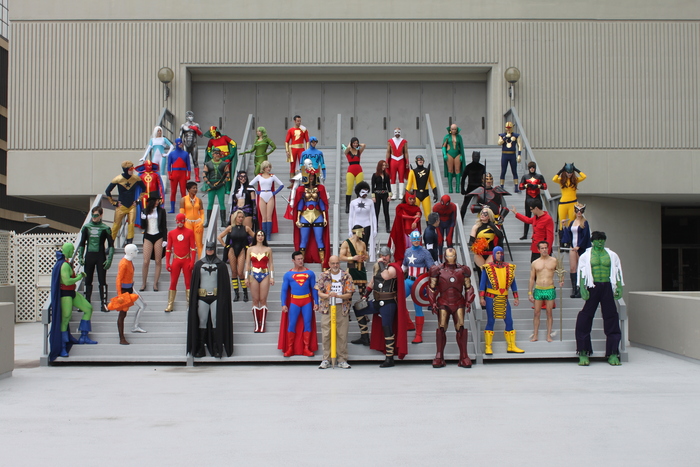Think of your favorite fandom. Books, movies, TV—it doesn’t matter. I’m going to assume you’ve got something you’re obsessed with. You’ve read the entire Harry Potter series, for instance, or you’ve watched both Star Wars trilogies. Have you done so more than once? More than twice? More than ten times? Could you replay the whole thing in your head during a particularly boring meeting?
Everyone is faced with two choices when consuming a piece of pop culture: re-experiencing an old favorite or trying something new. Arguments can be made for either course of action. Oftentimes—especially for geeks, it seems—the desire to relive the familiar outweighs the risk of trying something new. What exactly is it that drives us to rewatch our favorite movie for the twentieth time instead of picking up something unknown? Why is the path of reconsumption so appealing?
In the August 2012 Journal of Consumer Research, Cristel Antonia Russell and Sidney J. Levy found that there are essentially two types of reconsumption: regressive and progressive. Regressive reconsumption generally occurs when there’s some sort of disruption or tension in your life that can be soothed by reliving something familiar. Progressive reconsumption occurs when there’s a desire to affirm or correct a previously held belief about a piece of media. The book or movie enlightens the consumer about his or her own life through a greater understanding of the piece of entertainment in question.
Regressive reconsumption has a sentimentality to it that’s certainly not unique to geekdom. You have a bad day at work and decide to order dinner from your favorite Thai food restaurant. You’re nervous about your favorite sports team making the playoffs, so you wear your threadbare lucky shirt.
 Geeks do this too. Hell, when I moved across the country last year, I threw myself into a Harry Potter series re-read, gladly escaping inside a world I knew very well in the midst of my unknown environment. Hogwarts was my security blanket.
Geeks do this too. Hell, when I moved across the country last year, I threw myself into a Harry Potter series re-read, gladly escaping inside a world I knew very well in the midst of my unknown environment. Hogwarts was my security blanket.
Where geekdom stands out, I believe, is in the category of progressive reconsumption, or the desire to know every detail about your passions. There’s a difference between knowing a story and knowing a story, and that difference separates the casual fans from the invested ones, the general public from the geeks.
There’s a certain level of notoriety that must be achieved within a subsect of the geek community before you can really become accepted by everyone else. It’s preposterous to say you’re a real Tolkien fan if you haven’t read The Silmarillion. You’re not really a gamer if you only play Mario Kart occasionally on the weekends. Frankly, this exclusive mentality is a shame. The term “geek” can have a negative connotation associated with it, placing those who identify with the term on the fringe of social acceptance. You’d think that because of this, geeks would be more cognizant of being welcoming to everyone, no matter their degree of obsession.
I’m guilty of this too. I give way too much grief to my friends who’ve only watched the Harry Potter movies and have never actually read the books. The effort it takes to read the books seems insignificant compared to the joy I know they’ll have once they reach this next level of knowledge about the series. It limits the depth and breadth of the conversation, which can be frustrating. I always have to remind myself that you can’t force-feed joy to someone. My devotion to a fandom shouldn’t dictate others’ level of commitment. Those with more knowledge ought to be teachers, not elitists. No one should have to fulfill an unofficial quota to gain entry into the fandom.
That, however, is not typically the gut reaction. In order to be considered part of the fandom, you need to reach a certain level of obsession. Reconsumption becomes a form of currency used to obtain respect and deference within the community. The more you know, the better you fit in—at least within the fandom.
 On the larger social spectrum, there are arguably no two groups as different as the jocks and the geeks. The jocks tend to be the charismatic heroes while the geeks are separated from the main clique, shunned and forgotten. While their paths in life may not usually cross, I would argue that the motivations of both groups are more similar than you might think. Both jocks and geeks are highly competitive and place a high amount of value on being the best. Jocks strive to win in sporting competitions while geeks strive to know the most about their favorite fandoms.
On the larger social spectrum, there are arguably no two groups as different as the jocks and the geeks. The jocks tend to be the charismatic heroes while the geeks are separated from the main clique, shunned and forgotten. While their paths in life may not usually cross, I would argue that the motivations of both groups are more similar than you might think. Both jocks and geeks are highly competitive and place a high amount of value on being the best. Jocks strive to win in sporting competitions while geeks strive to know the most about their favorite fandoms.
According to Psychology Today, our interest in being the best reflects “our belief that competition is good and [is] the best way to gauge the value of our individual and collective enterprise. [It appeals to] the need for differentiation—the social need to categorize people as winners or losers.”
Competition is primal. There’s an inherent need to create divisions within a group: winners and losers. In geekdom, the more knowledgeable you are, the more firmly you can place yourself in the knowledgable winners’ camp. The social integration that could traditionally be denied to them in general society is theirs for the taking within the geek community.
Does that mean that geeks only rewatch and reread their favorite forms of entertainment in order to reach the top of the geekdom social pyramid? Of course not. But is this need to belong and to boost one’s own sense of self-worth an element that could play into why geeks seem to rewatch a particular TV show more than other social groups? I believe so.
In a 2012 article on CNN, Amanda Enayati wrote about how important it is for people to feel as though they belong. She references an ongoing study by George Walton, social psychologist from Stanford University, who claims that “belonging is a psychological lever that has broad consequences. Our interests, motivation, health, and happiness are inextricably tied to the feeling that we belong to a greater community that may share common interests and aspirations.”
By delving so heartily into the world of geekdom, individuals satisfy their need to belong. They’re motivated by this inherent desire to feel firmly like part of a like-minded community, whether within the pages of their favorite book or within the fandom outside.
 At the end of the day, we’re all just looking for ways to fit in and be part of something bigger. The obsessive need to know everything about a given fandom integrates someone deeper into that community and helps provide connections among strangers. My roommates and I first bonded over a shared love of Harry Potter and Gilmore Girls. I’ve bonded with friends’ boyfriends over a conversation about Tom Bombadil’s absence from the Lord of the Rings movies. Obsession becomes a tool that can be used to connect people no matter their life experiences. Taken to the extreme, it could certainly result in unhealthy behaviors with individuals spending their entire lives re-consuming, never using it as a tool to help create connections with others. However, if you stay mindful, your third Firefly marathon weekend isn’t quite the waste of time others might make it out to be.
At the end of the day, we’re all just looking for ways to fit in and be part of something bigger. The obsessive need to know everything about a given fandom integrates someone deeper into that community and helps provide connections among strangers. My roommates and I first bonded over a shared love of Harry Potter and Gilmore Girls. I’ve bonded with friends’ boyfriends over a conversation about Tom Bombadil’s absence from the Lord of the Rings movies. Obsession becomes a tool that can be used to connect people no matter their life experiences. Taken to the extreme, it could certainly result in unhealthy behaviors with individuals spending their entire lives re-consuming, never using it as a tool to help create connections with others. However, if you stay mindful, your third Firefly marathon weekend isn’t quite the waste of time others might make it out to be.
Featured image via WishitWas1984. Wizarding World of Harry Potter image via Amanda Richards. Star Wars image via Andrea Guzman. Dragon Con image via Jeff James.


